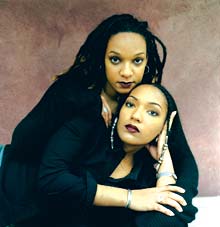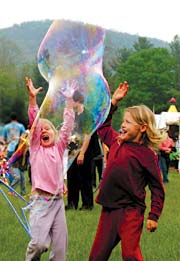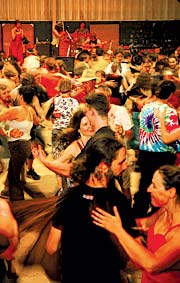It’s always been cool to be French. They created the Bohemian style, Amélie and the phrase meant to describe a certain indefinable something, “je ne sais quois.” These days, all things African are also cool—as in Afrobeat music, South Africa as the new fashion mecca, and cute, adoptable kids. But that’s another story.

Trends aside, French-Cameroonian duo Les Nubians (sisters who perform at Lake Eden Arts Festival this weekend) are cool by any standards. When, as unknowns, they couldn’t convince any professional musicians to back them, they performed a cappella. When their French-language songs met with a lukewarm reception in Paris, they exported their sound to an enthusiastic American audience. And when Célia and Hélène Faussart were named among the most successful French-language musical groups in the United States, they merely contended that it proved what they already knew: They not only possess je ne sais quoi to burn, their palpable finesse transcends both language and nationality.
“Music is a language by itself,” Hélène, the elder sister, tells Xpress. “Wherever that world music is coming from, it gives us roundtrip tickets to that culture.
“It’s one of the most natural ways we have to relate,” she adds. “It’s the easiest. For 99 cents on iTunes you can buy a beautiful track.”
Unfortunately, finding Les Nubians tracks on iTunes is not so easy. The duo’s second album, One Step Forward (released five years after their 1998 debut, Princesses Nubiennes), is conspicuously absent despite the disc’s English-language tracks geared toward their American fan base.

Forward is also the album where the Faussart sisters began working with spoken-word artists, such as on the pop hit “Temperature Rising,” featuring (depending on the version) the voices of French slammer John Banzai or American rapper Talib Kweli flowing over the reggae-inspired grooves.
This exploration is continued on their third album, Echos: Chapter One—Nubian Voyager, which finds the Faussarts playing a supporting role to the poets with whom they often collaborate. Perhaps not surprisingly, the album mostly confounded critics. “Not only are the cringe-inducing moments few and far between … it’s (gulp) pretty damn good,” PopMatters hesitantly offered.
“It’s a never-ending story and a long-term investment,” Hélène says of the collaboration. Even on the eve of a new Les Nubians release, the Faussarts still bring Echos poets to open their shows and work with those artists to teach spoken-word programs in French and African schools. “Echos is a family, a group of artists who have skills they’re ready to share,” Hélène says.
Perhaps Les Nubians’ own humble beginnings fuel their desire to help other artists succeed.
“We were just girls,” Célia says of their early years.
“The guys were like, ‘Come and do my backing vocals,’” recalls Hélène. “Musicians can be very macho. Now we write our own music and they respect that.”
In fact, the sisters have performed with the likes of the Black Eyed Peas and their own childhood hero, Youssou N’Dour. Their work has taken them around the world. They live in New York, Paris and various African cities—“You don’t want to know how much we travel,” moans Célia.
In May, the sisters performed at Festival Mizik Jakmel: The First International Music Festival in Haiti, an experience that seemed to confirm Hélène’s belief that the African diaspora is growing increasingly connected through travel, the Internet and, of course, music.
“African-Americans and Afropeans [Les Nubians’ name for their own multi-ethnic heritage] are getting together and sharing important events,” the performer notes. “It’s important to know that people on the other side of the Atlantic are sharing similar experiences.”
One major part of that experience is defying racial stereotypes of what people of African decent are like. For instance, Célia recalls that when Les Nubians began performing in the United States, some fans were surprised to hear black people speaking French. By simply continuing their artistic explorations, the Faussart sisters continue to challenge such perceptions.
And their next step? Though Les Nubians won’t discuss their newest work—except to say there will be surprises—Hélène has her eye on the future.
“We’re still covering new territories,” she promises.
Lakeside Main Stage headliners

Friday
• 4 p.m.: Krush Groove of Urban Arts Institute
• 4:45-5:45 p.m.: Bio Ritmo (Latin)
• 6:30-7 p.m.: Henry Butler with Tambourine Lady and John Boutte (New Orleans blues)
• 8:30-9:30 p.m.: Tony Triska (bluegrass)
• 10:15 p.m.-midnight: Fishbone (punk)
Saturday
• 10-10:45 a.m.: Masankho Banda (African)
• 11 a.m.-noon: Imhotep with Reid Center & Pisgah View Youth
• 12:30-1:30 p.m.: Mac Arnold (blues)
• 2-3 p.m.: John Boutte (New Orleans)
• 3:30-4:30 p.m.: Darrell Rose, David LaMotte, Zulu Connection, Imhotep, Maria Voisin and Klondyke Coyotes (Leaf in Schools & Streets showcase)
• 5-6 p.m.: Kiyoshi Nagata Ensemble (Japanese drums)
• 6:45-8 p.m.: The Wilders (honky-tonk)
• 8:30-9:30 p.m.: Michael Franti (hip-hop)
• 10 p.m.-midnight: Les Nubians (“Afropean”)
Sunday
• 9:30-10:30 a.m.: Hassan Hakmoun (Moroccan)
• 11 a.m.-noon: Jabali African Acrobats of Kenya
• 12:30-1:30 p.m.: Mizero Children’s Troupe with Jean Paul Samputu (Rwandan)
• 2-3 p.m.: John Doyle and Liz Carroll (Celtic)
• 3:30-5:15 p.m.: Doc Watson, Richard Watson and David Holt (bluegrass)
• 5:30-6 p.m.: Closing ceremony with Zulu Connection and the Hillcrest Marching Band



Before you comment
The comments section is here to provide a platform for civil dialogue on the issues we face together as a local community. Xpress is committed to offering this platform for all voices, but when the tone of the discussion gets nasty or strays off topic, we believe many people choose not to participate. Xpress editors are determined to moderate comments to ensure a constructive interchange is maintained. All comments judged not to be in keeping with the spirit of civil discourse will be removed and repeat violators will be banned. See here for our terms of service. Thank you for being part of this effort to promote respectful discussion.